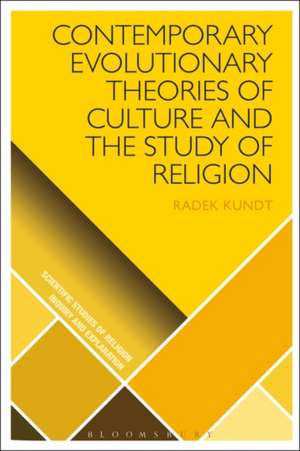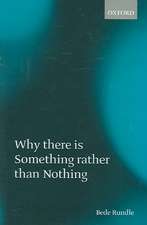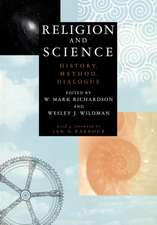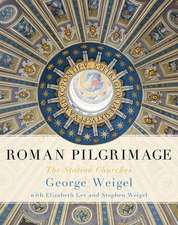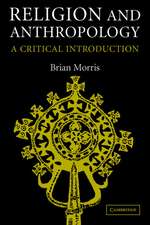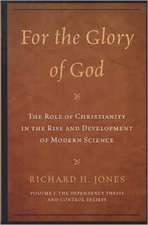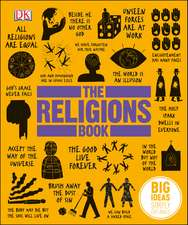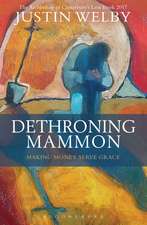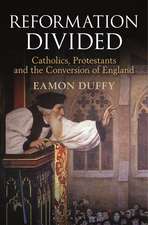Contemporary Evolutionary Theories of Culture and the Study of Religion: Scientific Studies of Religion: Inquiry and Explanation
Autor Professor Radek Kundten Limba Engleză Paperback – 17 mai 2017
| Toate formatele și edițiile | Preț | Express |
|---|---|---|
| Paperback (1) | 255.66 lei 43-57 zile | |
| Bloomsbury Publishing – 17 mai 2017 | 255.66 lei 43-57 zile | |
| Hardback (1) | 772.17 lei 43-57 zile | |
| Bloomsbury Publishing – 18 noi 2015 | 772.17 lei 43-57 zile |
Din seria Scientific Studies of Religion: Inquiry and Explanation
- 22%
 Preț: 149.02 lei
Preț: 149.02 lei - 23%
 Preț: 192.55 lei
Preț: 192.55 lei - 30%
 Preț: 511.64 lei
Preț: 511.64 lei - 23%
 Preț: 191.75 lei
Preț: 191.75 lei - 21%
 Preț: 218.65 lei
Preț: 218.65 lei - 21%
 Preț: 218.09 lei
Preț: 218.09 lei - 23%
 Preț: 229.41 lei
Preț: 229.41 lei - 13%
 Preț: 194.06 lei
Preț: 194.06 lei - 24%
 Preț: 190.16 lei
Preț: 190.16 lei - 21%
 Preț: 217.91 lei
Preț: 217.91 lei - 13%
 Preț: 237.57 lei
Preț: 237.57 lei - 24%
 Preț: 190.06 lei
Preț: 190.06 lei - 22%
 Preț: 231.63 lei
Preț: 231.63 lei - 24%
 Preț: 190.06 lei
Preț: 190.06 lei - 23%
 Preț: 191.67 lei
Preț: 191.67 lei - 23%
 Preț: 191.38 lei
Preț: 191.38 lei - 22%
 Preț: 238.11 lei
Preț: 238.11 lei - 30%
 Preț: 596.81 lei
Preț: 596.81 lei - 22%
 Preț: 225.12 lei
Preț: 225.12 lei - 21%
 Preț: 217.82 lei
Preț: 217.82 lei - 22%
 Preț: 237.93 lei
Preț: 237.93 lei - 22%
 Preț: 256.20 lei
Preț: 256.20 lei - 23%
 Preț: 191.38 lei
Preț: 191.38 lei - 30%
 Preț: 512.37 lei
Preț: 512.37 lei - 13%
 Preț: 257.03 lei
Preț: 257.03 lei - 30%
 Preț: 511.07 lei
Preț: 511.07 lei - 30%
 Preț: 717.79 lei
Preț: 717.79 lei
Preț: 255.66 lei
Preț vechi: 330.21 lei
-23% Nou
Puncte Express: 383
Preț estimativ în valută:
48.92€ • 51.21$ • 40.72£
48.92€ • 51.21$ • 40.72£
Carte tipărită la comandă
Livrare economică 31 martie-14 aprilie
Preluare comenzi: 021 569.72.76
Specificații
ISBN-13: 9781350037076
ISBN-10: 1350037079
Pagini: 192
Dimensiuni: 259 x 159 x 15 mm
Greutate: 0.27 kg
Ediția:NIPPOD
Editura: Bloomsbury Publishing
Colecția Bloomsbury Academic
Seria Scientific Studies of Religion: Inquiry and Explanation
Locul publicării:London, United Kingdom
ISBN-10: 1350037079
Pagini: 192
Dimensiuni: 259 x 159 x 15 mm
Greutate: 0.27 kg
Ediția:NIPPOD
Editura: Bloomsbury Publishing
Colecția Bloomsbury Academic
Seria Scientific Studies of Religion: Inquiry and Explanation
Locul publicării:London, United Kingdom
Caracteristici
Offers an alternative evolutionary approach for the study of culture and religion which does not rely on the principles of neo-Darwinian evolution.
Notă biografică
Radek Kundt is Assistant Professor in the Department for the Study of Religions, Masaryk University, Czech Republic, where he also acts as Director of LEVYNA - Laboratory for the Experimental Research of Religion.
Cuprins
PrefaceIntroductionPart 1: Classical Cultural Evolutionism1. Classical Cultural Evolutionism and the Origins of Religious Studies2. Critique of Classical Cultural EvolutionismPart 2: Contemporary Cultural Evolutionism3. Group Selection AccountsGroup Selection Accounts in Religious StudiesCritical analysis of group selection accounts4. Dual Inheritance AccountsDual inheritance accounts in Religious StudiesCritical analysis of dual inheritance accounts5. Memetic AccountsMemetic accounts in Religious StudiesCritical analysis of memetic accountsPart 3: Evolution Without Cultural Evolution6. The Evolutionary Study of Culture Without Cultural Evolution7. An Evolution-Without-Cultural-Evolution Approach in Religious StudiesConclusionBibliographyIndex
Recenzii
In this erudite work Radek Kundt expertly guides us through the thickets of evolutionary theory as this is applied to cultural forms in general and religious behavior in particular. His critical analyses are accurate and compelling, his descriptions of the various approaches instructive, and his suggestions productive. We are all in his debt.
Wonderful and badly needed ... The value of Kundt's book can hardly be overestimated ... A wonderful book, most learned, and desperately needed according to the demands of multidisciplinarity.
It is a book that will help to clear the fog surrounding the use of evolutionary thought mainly in the field of the study of religion. Its clarity and analytical power will be much appreciated by every scholar who aspires to interweave his or her study of religion with an understanding of the biological, evolutionary underpinnings of humanity and their relevance to culture.
Scholars of religion will appreciate Kundt's contribution, as will anyone interested in the scientific (evolutionary) study of culture. It comes with the much-needed theoretical clarifications and classifications of the theory of evolution in relation to culture and defines the standards for its proper use ... Particularly intriguing are Kundt's remarks regarding the influences on the scientific process itself that are happening "behind the scenes" - be they personal biases, ideological abuses or funding scheme agendas. I thus recommend this text for all academics wanting to engage in a serious discussion about evolutionary theorizing and its role and place in the study of human cultural behaviour.
Embodying the scientific ideals of current generations, Kundt attempts to transform cultural and religious studies into informed and competent human sciences. His insightful, well-argued introduction to and criticisms of classical and contemporary evolutionary theories is a wake-up call against complacency in a field that is ever-more crucial in contemporary affairs.
Wonderful and badly needed ... The value of Kundt's book can hardly be overestimated ... A wonderful book, most learned, and desperately needed according to the demands of multidisciplinarity.
It is a book that will help to clear the fog surrounding the use of evolutionary thought mainly in the field of the study of religion. Its clarity and analytical power will be much appreciated by every scholar who aspires to interweave his or her study of religion with an understanding of the biological, evolutionary underpinnings of humanity and their relevance to culture.
Scholars of religion will appreciate Kundt's contribution, as will anyone interested in the scientific (evolutionary) study of culture. It comes with the much-needed theoretical clarifications and classifications of the theory of evolution in relation to culture and defines the standards for its proper use ... Particularly intriguing are Kundt's remarks regarding the influences on the scientific process itself that are happening "behind the scenes" - be they personal biases, ideological abuses or funding scheme agendas. I thus recommend this text for all academics wanting to engage in a serious discussion about evolutionary theorizing and its role and place in the study of human cultural behaviour.
Embodying the scientific ideals of current generations, Kundt attempts to transform cultural and religious studies into informed and competent human sciences. His insightful, well-argued introduction to and criticisms of classical and contemporary evolutionary theories is a wake-up call against complacency in a field that is ever-more crucial in contemporary affairs.
